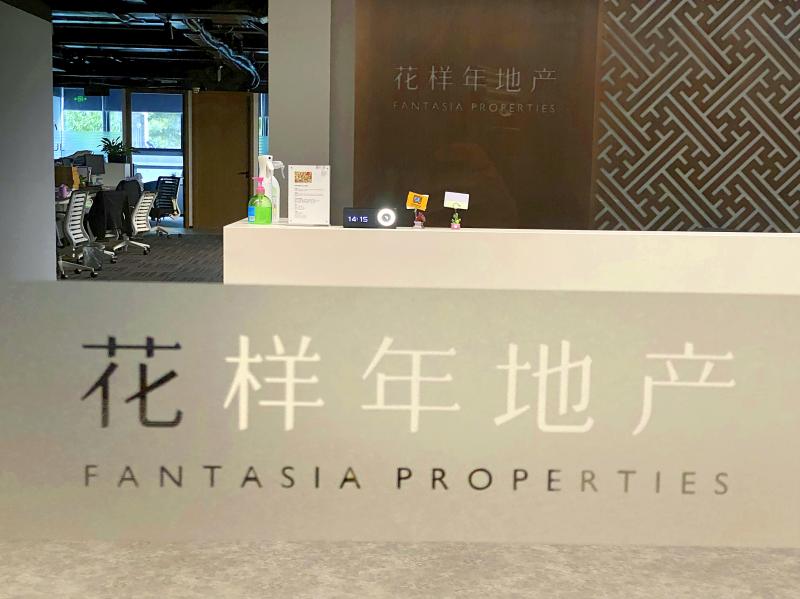Fantasia Holdings Group (花樣年控股集團), a Chinese homebuilder, on Monday missed payments on debt obligations, adding to worries over the country’s property sector as embattled giant China Evergrande Group (恆大集團) teeters on the brink of collapse.
Fears of contagion through the Chinese economy have grown as Evergrande, the most indebted of the country’s private homebuilders, struggles with more than US$300 billion in liabilities and heads toward a massive restructuring.
Fantasia Holdings failed to repay a US$205.7 million note, the Shenzhen-based company said in a statement.

Photo: AP
This came as property management firm Country Garden Services Holdings Co (碧桂園) added that a unit of Fantasia had missed repayment on a 700 million yuan (US$108 million) loan, saying it was likely that Fantasia would default.
The news comes as investors await news from Evergrande after it suspended trading of its shares on Monday pending an announcement on a “major transaction,” with reports saying Hong Kong real-estate firm Hopson Development Holdings Ltd (合生創展集團) planned to buy a 51 percent stake in its property services arm.
While Fantasia is a smaller player in the market than Evergrande, its struggles highlight investor concerns over companies’ financial disclosures.
Fitch Ratings on Monday downgraded Fantasia to “CCC-,” which indicates default is a possibility.
The ratings agency said in a statement that although media reports said Fantasia missed an earlier payment to bondholders, the bond “does not appear to have been disclosed in the company’s financial reports.”
“We believe the existence of these bonds means that the company’s liquidity situation could be tighter than we previously expected,” it said.
“Furthermore, this incident casts doubt on the transparency of the company’s financial disclosures,” it said.
Separately, S&P Global Ratings has downgraded another Chinese property firm — Sinic Holdings Group Co (新力控股集團) — saying that its “debt-servicing ability has almost been depleted.”
Sinic has been unable to service interest repayments, which could result in “accelerating repayments on Sinic’s other debt obligations,” S&P said on Monday.
Fitch yesterday downgraded Shanghai-based Sinic from “CCC” to “C,” reflecting its view that “a default-like process has begun” for the company.
Sinic chairman Zhang Yuanlin (張園林) last month lost more than US$1 billion in a market meltdown linked to fears about Evergrande.
Forbes reported that Zhang’s net worth dropped from US$1.3 billion to US$250.7 million on Sept. 20, when his firm was forced to halt trading in Hong Kong following an 87 percent slump in its share price.
China’s real-estate sector has been under tightened scrutiny in the past few months, with regulators last year announcing caps for three different debt ratios in a scheme dubbed the “three red lines.”
Beijing has stayed silent on the travails of Evergrande, but state media has trailed responses in a nod to the mood toward a private company that grew on a debt binge in the boom years of Chinese real estate.

China’s Huawei Technologies Co (華為) plans to start mass-producing its most advanced artificial intelligence (AI) chip in the first quarter of next year, even as it struggles to make enough chips due to US restrictions, two people familiar with the matter said. The telecoms conglomerate has sent samples of the Ascend 910C — its newest chip, meant to rival those made by US chipmaker Nvidia Corp — to some technology firms and started taking orders, the sources told Reuters. The 910C is being made by top Chinese contract chipmaker Semiconductor Manufacturing International Corp (SMIC, 中芯) on its N+2 process, but a lack

NVIDIA PLATFORM: Hon Hai’s Mexican facility is to begin production early next year and a Taiwan site is to enter production next month, Nvidia wrote on its blog Hon Hai Precision Industry Co (鴻海精密), the world’s biggest electronics manufacturer, yesterday said it is expanding production capacity of artificial intelligence (AI) servers based on Nvidia Corp’s Blackwell chips in Taiwan, the US and Mexico to cope with rising demand. Hon Hai’s new AI-enabled factories are to use Nvidia’s Omnivores platform to create 3D digital twins to plan and simulate automated production lines at a factory in Hsinchu, the company said in a statement. Nvidia’s Omnivores platform is for developing industrial AI simulation applications and helps bring facilities online faster. Hon Hai’s Mexican facility is to begin production early next year and the

Who would not want a social media audience that grows without new content? During the three years she paused production of her short do-it-yourself (DIY) farmer’s lifestyle videos, Chinese vlogger Li Ziqi (李子柒), 34, has seen her YouTube subscribers increase to 20.2 million from about 14 million. While YouTube is banned in China, her fan base there — although not the size of YouTube’s MrBeast, who has 330 million subscribers — is close to 100 million across the country’s social media platforms Douyin (抖音), Sina Weibo (新浪微博) and Xiaohongshu (小紅書). When Li finally released new videos last week — ending what has

AVIATION BOOM: CAL is to renew its passenger and cargo fleets starting next year on record profits as aviation continues to return to pre-pandemic levels China Airlines Ltd (CAL, 中華航空) yesterday said it is optimistic about next year’s business outlook, as the airline continues to renew its fleet on expectations that global passenger traffic would maintain steady growth and air cargo demand would remain strong. From next year to 2028, the airline is to welcome a new Boeing Co 787 fleet — 18 787-9 and six 787-10 passenger aircraft — to cover regional and medium to long-haul destinations, CAL chairman Hsieh Shih-chien (謝世謙) said at an investors’ conference in Taipei. The airline would also continue to introduce Airbus SE 321neo passenger planes and Boeing 777F cargo jets,